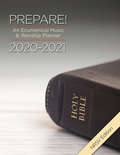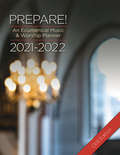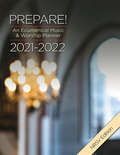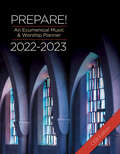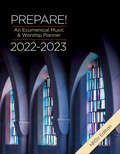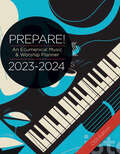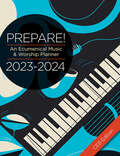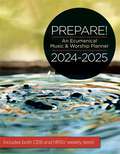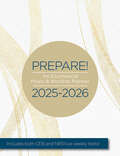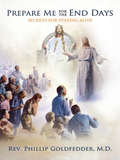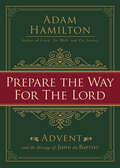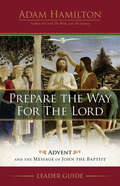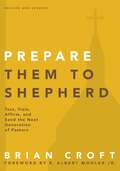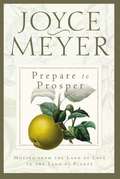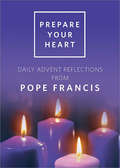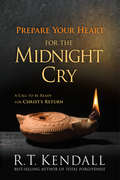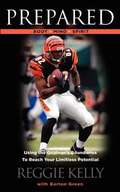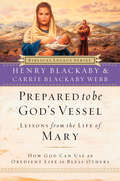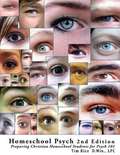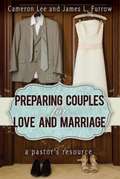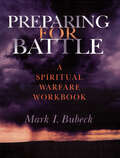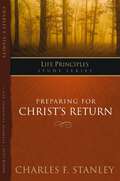- Table View
- List View
Prepare! 2020-2021 NRSV Edition: An Ecumenical Music & Worship Planner
by Mary Scifres David L. BoneAn all-in-one resource that helps both the music director and pastor plan the worship services for each Sunday and holy day of the church year, the 2020-2021 edition of Prepare! is lectionary based and places everything at your fingertips: Calendar format that helps you plan the entire choir year, from September through August. Eight or more suggested hymns for each service keyed to 16 hymnals from at least 7 different denominations, including: Africana Hymnal, The Baptist Hymnal, Chalice Hymnal (Disciples of Christ), The Faith We Sing, Glory to God: The Presbyterian Hymnal, The Hymnal 1982 (Episcopal), Hymns for the Family of God, Lutheran Book of Worship, The Presbyterian Hymnal, The New Century Hymnal (United Church of Christ), Renew! Songs & Hymns for Blended Worship, Songs for Praise and Worship Singalong Edition, The United Methodist Hymnal, Voices United, Worship & Song, and Worship III (Roman Catholic). Complete lectionary text of the Old Testament, Psalm, Epistle, and Gospel readings, using the New Revised Standard Version of the Bible. Reproducible worship planning forms. Resources for holidays and special days. Suggestions for prayers, solos, anthems, visuals, and much more. Also available with Common English Bible (CEB) lectionary texts (ISBN 9781501896446).
Prepare! 2021-2022 CEB Edition: An Ecumenical Music & Worship Planner
by David L. Bone Mary ScifresAn all-in-one resource that helps both the music director and pastor plan the worship services for each Sunday and holy day of the church year, the 2021-2022 edition Prepare! is lectionary based and places everything at your fingertips: New theme index! Includes themes like: assurance, doubt, family, justice, prayer, temptation, and many more. Scripture Index. Calendar format that helps you plan the entire choir year, from September through August. Eight or more suggested hymns for each service keyed to 16 hymnals from at least 7 different denominations, including: Africana Hymnal, The Baptist Hymnal, Chalice Hymnal (Disciples of Christ), The Faith We Sing, Glory to God: The Presbyterian Hymnal, The Hymnal 1982 (Episcopal), Hymns for the Family of God, Lutheran Book of Worship, The Presbyterian Hymnal, The New Century Hymnal (United Church of Christ), Renew! Songs & Hymns for Blended Worship, Songs for Praise and Worship Singalong Edition, The United Methodist Hymnal, Voices United, Worship & Song, and Worship III (Roman Catholic). Complete lectionary text of the Old Testament, Psalm, Epistle, and Gospel readings, using the Common English Bible translation. Reproducible worship planning forms. Resources for holidays and special days. Suggestions for prayers, solos, anthems, visuals, and much more.
Prepare! 2021-2022 NRSV Edition: An Ecumenical Music & Worship Planner
by David L. Bone Mary ScifresAn all-in-one resource that helps both the music director and pastor plan the worship services for each Sunday and holy day of the church year, the 2021-2022 edition Prepare! is lectionary based and places everything at your fingertips: New theme index! Includes themes like: assurance, doubt, family, justice, prayer, temptation, and many more. Scripture Index. Calendar format that helps you plan the entire choir year, from September through August. Eight or more suggested hymns for each service keyed to 16 hymnals from at least 7 different denominations, including: Africana Hymnal, The Baptist Hymnal, Chalice Hymnal (Disciples of Christ), The Faith We Sing, Glory to God: The Presbyterian Hymnal, The Hymnal 1982 (Episcopal), Hymns for the Family of God, Lutheran Book of Worship, The Presbyterian Hymnal, The New Century Hymnal (United Church of Christ), Renew! Songs & Hymns for Blended Worship, Songs for Praise and Worship Singalong Edition, The United Methodist Hymnal, Voices United, Worship & Song, and Worship III (Roman Catholic). Complete lectionary text of the Old Testament, Psalm, Epistle, and Gospel readings, using the New Revised Standard Version Bible translation. Reproducible worship planning forms. Resources for holidays and special days. Suggestions for prayers, solos, anthems, visuals, and much more.
Prepare! 2022-2023 CEB Edition - eBook [ePub]: An Ecumenical Music & Worship Planner
by David L. Bone Mary ScifresAn all-in-one resource that helps both the music director and pastor plan the worship services for each Sunday and holy day of the church year, the 2022-2023 edition Prepare! is lectionary based and places everything at your fingertips: - New theme index! Includes themes like: assurance, doubt, family, justice, prayer, temptation, and many more. - Scripture Index. - Calendar format that helps you plan the entire choir year, from September through August. - Eight or more suggested hymns for each service keyed to 16 hymnals from at least 7 different denominations, including: Africana Hymnal, The Baptist Hymnal, Chalice Hymnal (Disciples of Christ), The Faith We Sing, Glory to God: The Presbyterian Hymnal, The Hymnal 1982 (Episcopal), Hymns for the Family of God, Lutheran Book of Worship, The Presbyterian Hymnal, The New Century Hymnal (United Church of Christ), Renew! Songs & Hymns for Blended Worship, Songs for Praise and Worship Singalong Edition, The United Methodist Hymnal, Voices United, Worship & Song, and Worship III (Roman Catholic).- Complete lectionary text of the Old Testament, Psalm, Epistle, and Gospel readings, using the Common English Bible translation. - Reproducible worship planning forms. - Resources for holidays and special days. - Suggestions for prayers, solos, anthems, visuals, and much more.
Prepare! 2022-2023 NRSV Edition - eBook [ePub]: An Ecumenical Music & Worship Planner
by David L. Bone Mary ScifresAn all-in-one resource that helps both the music director and pastor plan the worship services for each Sunday and holy day of the church year, the 2022-2023 edition Prepare! is lectionary based and places everything at your fingertips: - New theme index! Includes themes like: assurance, doubt, family, justice, prayer, temptation, and many more. - Scripture Index. - Calendar format that helps you plan the entire choir year, from September through August. - Eight or more suggested hymns for each service keyed to 16 hymnals from at least 7 different denominations, including: Africana Hymnal, The Baptist Hymnal, Chalice Hymnal (Disciples of Christ), The Faith We Sing, Glory to God: The Presbyterian Hymnal, The Hymnal 1982 (Episcopal), Hymns for the Family of God, Lutheran Book of Worship, The Presbyterian Hymnal, The New Century Hymnal (United Church of Christ), Renew! Songs & Hymns for Blended Worship, Songs for Praise and Worship Singalong Edition, The United Methodist Hymnal, Voices United, Worship & Song, and Worship III (Roman Catholic). Complete lectionary text of the Old Testament, Psalm, Epistle, and Gospel readings, using the New Revised Standard Version Bible translation. - Reproducible worship planning forms. - Resources for holidays and special days. - Suggestions for prayers, solos, anthems, visuals, and much more.
Prepare! 2023-2024 CEB Edition: An Ecumenical Music & Worship Planner
by David L. Bone Mary ScifresA weekly worship planning book for pastors and musicians.An all-in-one resource that helps both the music director and pastor plan the worship services for each Sunday and holy day of the church year, the 2023-2024 edition Prepare! is lectionary based and placeseverything at your fingertips:- New theme index! Includes themes like: assurance, doubt, family, justice, prayer, temptation, and many more.- Scripture Index.- Calendar format that helps you plan the entire choir year, from September through August.- Eight or more suggested hymns for each service keyed to 16 hymnals from at least 7 different denominations, including: Africana Hymnal, The Baptist Hymnal, Chalice Hymnal (Disciples of Christ), The Faith We Sing, Glory to God: The Presbyterian Hymnal, The Hymnal 1982 (Episcopal), Hymns for the Family of God, Lutheran Book of Worship, The Presbyterian Hymnal, The New Century Hymnal (United Church of Christ), Renew! Songs & Hymns for Blended Worship, Songs for Praise and Worship Singalong Edition, The United Methodist Hymnal, Voices United, Worship & Song, and Worship III (Roman Catholic).- Complete lectionary text of the Old Testament, Psalm, Epistle, and Gospel readings, using the Common English Bible translation.- Reproducible worship planning forms.- Resources for holidays and special days.- Suggestions for prayers, solos, anthems, visuals, and much more.Also available with New Revised Standard Version (NRSV) texts
Prepare! 2023-2024 NRSVue Edition: An Ecumenical Music & Worship Planner
by David L. Bone Mary ScifresA weekly worship planning book for pastors and musicians.An all-in-one resource that helps both the music director and pastor plan the worship services for each Sunday and holy day of the church year, the 2023-2024 edition of Prepare! is lectionary based and places everything at your fingertips:- New theme index! Includes themes like: assurance, doubt, family, justice, prayer, temptation, and many more.- Scripture Index.- Calendar format that helps you plan the entire choir year, from September through August.- Eight or more suggested hymns for each service keyed to 16 hymnals from at least 7 different denominations, including: Africana Hymnal, The Baptist Hymnal, Chalice Hymnal (Disciples of Christ), The Faith We Sing, Glory to God: The Presbyterian Hymnal, The Hymnal 1982 (Episcopal), Hymns for the Family of God, Lutheran Book of Worship, The Presbyterian Hymnal, The New Century Hymnal (United Church of Christ), Renew! Songs & Hymns for Blended Worship, Songs for Praise and Worship Singalong Edition, The United Methodist Hymnal, Voices United, Worship & Song, and Worship III (Roman Catholic).- Complete lectionary text of the Old Testament, Psalm, Epistle, and Gospel readings, using the New Revised Standard Version Updated Edition of the Bible.- Reproducible worship planning forms.- Resources for holidays and special days.- Suggestions for prayers, solos, anthems, visuals, and much more.Also available with Common English Bible (CEB) lectionary texts
Prepare! 2024-2025 CEB/NRSVue Edition: An Ecumenical Music & Worship Planner
by David L. Bone Mary ScifresA weekly worship planning book for pastors and musicians – Refreshed!We listened carefully to customer feedback and added many new features to make these resources more powerful, more useful, and easier to use for people in local churches of all sizes!You’ll find new features like:- The full text from the two most-used Scripture translations, NRSVue and CEB.- Blank writing space to record your plans, ideas, and questions.- Recommendations for music geared for smaller choirs, solos, duets, and other ensembles.- Many new hymn and song suggestions, as well as more song suggestions for modern or contemporary services.- Suggested themes for each week, a helpful Theme Index, plus a Scripture Index.- Weekly suggestions for using visuals in worship.- Reproducible Worship Planning Sheets- This beloved planning tool still begins on the first Sunday in SeptemberAn all-in-one resource that helps both the music director and pastor plan the worship services for each Sunday and holy day of the church year, the 2024-2025 edition of Prepare! is lectionary-based and places everything at your fingertips:- Theme index! Includes themes like assurance, doubt, family, justice, prayer, temptation, and many more- Scripture Index- Calendar format that helps you plan the entire choir year, from September through August- Eight or more suggested hymns for each service keyed to 16 hymnals from at least seven different denominations, including Africana Hymnal, The Baptist Hymnal, Chalice Hymnal (Disciples of Christ), The Faith We Sing, Glory to God: The Presbyterian Hymnal, The Hymnal 1982 (Episcopal), Hymns for the Family of God, Lutheran Book of Worship, The Presbyterian Hymnal, The New Century Hymnal (United Church of Christ), Renew! Songs & Hymns for Blended Worship, Songs forPraise and Worship Sing along Edition, The United Methodist Hymnal, Voices United, Worship& Song, and Worship III (Roman Catholic)- Complete lectionary text of the Old Testament, Psalm, Epistle, and Gospel readings, using the CEB and NRSVue translationsIn addition, you will find more:- Consistent Worship elements- Content for contemporary worship services- More innovative worship elements
Prepare! 2025-2026 CEB/NRSVue Edition
by David L. Bone Mary ScifresA weekly worship planning book for pastors and musicians—refreshed!Discover the enhanced 2025-2026 edition of Prepare!, your ultimate music and worship planning companion for local churches of all sizes. This updated resource has new features, including full texts from the popular CEB and NRSVue Scripture translations, blank writing space for your ideas, music recommendations for various ensembles, hymn and song suggestions, visual worship suggestions, and more.With a user-friendly layout and comprehensive indexes, Prepare! makes planning worship services easier for both music directors and pastors. This all-in-one spiral bound guide provides everything you need to plan worship throughout the Church Year. It includes extensive musical suggestions from a wide range of denominations, including the standard hymnals from the major Christian churches.Hymnals: Africana Hymnal, The Baptist Hymnal, Chalice Hymnal (Disciples of Christ), The Faith We Sing, Glory to God: The Presbyterian Hymnal, The Hymnal 1982 (Episcopal), Hymns for the Family of God, Lutheran Book of Worship, The Presbyterian Hymnal, The New Century Hymnal (United Church of Christ), Renew! Songs & Hymns for Blended Worship, Songs for Praise and Worship Sing along Edition, The United Methodist Hymnal, Voices United, Worship & Song, and Worship III (Roman Catholic).
Prepare For Battle: Basic Training in Spiritual Warfare
by Neal Pirolo"I hate war!" Neal declares in his opening paragraph. "But my hatred for the enemy of our souls is greater than my abhorrence of war!" Making reference to over 700 Scriptures that point to victory in battle, Neal focuses on the basics, yet with significant, new insights: Spiritual Armor, Spiritual Weapons, Our Attitude Toward War, Tactics of satan, Spiritual Authority, Principles of War, and Strategies for Battlefield Living. Each chapter is followed by PRACTICAL INSIGHTS written by Yvonne from her experiences. Reader comments: "Some people deny that we are at war, yet others have convoluted ideas about it. Neither is effective in battle. The Pirolos' understanding of spiritual warfare (based on Scripture) and their own experiences (also based on Scripture) provide insightful and useful help for any Christian's life." Aimee W. "This is a practical, concise manual on spiritual warfare. It is simple to read and understand, but very well thought out and very Scripturally-based. This book is not just for pastors and missionaries, but should be in the library of every Christian." Michelle V.
Prepare Me For The End Days: Secrets For Staying Alive
by Rev Phillip GoldfedderLiving in these end days is the end of the end, that is, the end of existence. Coping with this upcoming potential tragedy of life can no longer be ignored regardless of the bypass mechanisms you employ to make it disappear. There is only one way to overcome the innumerable fears associated with this and that is by saying good-bye to the world's system and saying hello to spiritual warfare through God. We are talking about unity for everyone, not our denominations, which really means division. The devil could care less about whether or not you live or die, but only if he can hurt God. This book will point out that Jesus has given you the authority to conquer and overcome through your comforter, the Holy Spirit. You will begin to learn to apply faith to every single circumstance in your life. That's called total victory for nothing shall shake you because God is directing you! You want to secure your future and comprehend that eternity in Heaven will be a welcome choice. Finally, you will have to get serious about the power of prayer, reading the Bible, memorizing Scriptures that support you, praying in tongues, seeking knowledge for more wisdom, and of course, utilizing faith which God has provided for you. Faith is FANTASTIC ADVENTURES IN TRUSTING HIM.
Prepare the Way for the Lord: Advent and the Message of John the Baptist
by Adam HamiltonPrepare to receive Christ this Advent with the message of John the Baptist and best-selling author and pastor Adam Hamilton in Prepare the Way for the Lord. For centuries, Christians have turned to the story and message of John the Baptist in the weeks leading up to Christmas. In Prepare the Way for the Lord: Advent and the Message of John the Baptist, best-selling author and pastor Adam Hamilton explores the Advent themes of John’s life and ministry, and how John calls all followers of Jesus to prepare our hearts for his coming. In each of the Gospels, the story of Jesus is intertwined with that of his cousin John, the one whom the prophets foretold would come to “prepare the way of the Lord.” When we hear the message of John the Baptist, it makes us and our world ready to receive Christ. Chapter topics include:1. A People Prepared for the Lord 2. God Is Gracious 3. The Fruit of Repentance 4. Witnesses Testifying to the LightTo use Prepare the Way for the Lord as a four-week Advent study, additional components include a comprehensive Leader Guide and DVD/Video sessions featuring Adam Hamilton.The book includes a link to free downloadable teaching resources for children and youth.
Prepare the Way for the Lord Leader Guide: Advent and the Message of John the Baptist
by Adam HamiltonPrepare to receive Christ this Advent with the message of John the Baptist and best-selling author and pastor Adam Hamilton in Prepare the Way for the Lord. For centuries, Christians have turned to the story and message of John the Baptist in the weeks leading up to Christmas. In Prepare the Way for the Lord: Advent and the Message of John the Baptist, best-selling author and pastor Adam Hamilton explores the Advent themes of John’s life and ministry, and how John calls all followers of Jesus to prepare our hearts for his coming. In each of the Gospels, the story of Jesus is intertwined with that of his cousin John, the one whom the prophets foretold would come to “prepare the way of the Lord.” When we hear the message of John the Baptist, it makes us and our world ready to receive Christ. Chapter topics include:1. A People Prepared for the Lord 2. God Is Gracious 3. The Fruit of Repentance 4. Witnesses Testifying to the Light The Leader Guide contains everything needed to guide a group through the four-week study including session plans, activities, and discussion questions, as well as multiple format options.
Prepare Them to Shepherd: Test, Train, Affirm, and Send the Next Generation of Pastors (Practical Shepherding Series)
by R. Albert Mohler Jr. Brian CroftAre You Called to Ministry? Those who are involved in full-time ministry often say they have been “called” to do what they do. But what does that mean? Who does the “calling,” and how is it received? In Prepare Them to Shepherd, pastor Brian Croft unpacks the biblical model for preparing individuals for full-time ministry. In the past, training and sending individuals into full-time pastoral ministry and missionary work was viewed as the responsibility of the local church. Today, much of that responsibility has been delegated to Bible colleges, seminaries, and parachurch and mission organizations. The aim of Prepare Them to Shepherd is to challenge local churches to recover the biblical model for ministerial training and assume responsibility to identify and prepare gifted and godly individuals for service in Christ’s body. Part of the Practical Shepherding series of books, this insightful book provides pastors and ministry leaders with the practical help they need to test, train, affirm, and send those who are called into ministry.
Prepare to Prosper: Moving from the Land of Lack to the Land of Plenty
by Joyce MeyerJoyce reveals an important foundational principle to show how you can experience the power and prosperity of God in your life.
Prepare Your Heart: Daily Advent Reflections from Pope Francis
by Theresa Khoo Marianne Lorraine Trouvé FSPPrepare your heart for the birth of Jesus with the inspiring words of Pope Francis! This daily devotional includes scripture citations for each day of the season, a selection of the Holy Father's writings, reflection questions, and a prayer. It will be the perfect volume to remind you to slow down and breathe in God's spirit, no matter how busy you are! Prepare Your Heart can nurture our desire for the joy of Christ that makes our lives complete. This is a fixed-format ebook, which preserves the design and layout of the original print book.
Prepare Your Heart for the Midnight Cry: A Call to be Ready for Christ's Return
by R.T. KendallThis book will help readers prepare their hearts in expectation, be watchful for the approaching move of God, and build a deeper relationship with Him.In this Spirit-inspired teaching respected scholar and theologian R. T. Kendall uses Jesus&’s parable of the ten virgins to describe the condition of the church in the last days. Many Charismatics and Pentecostals assume that what we have seen in the one hundred years since Azusa Street is the final move of God before the Second Coming. Kendall explains that this is not so and reveals that a movement of the Holy Spirit, which is one hundred times greater than anything we have seen—indeed the greatest since Pentecost—is about to unfold. It&’s time to wake up!
Prepared: Using the Gridiron's Boundaries to Reach Your Limitless Potential
by Reggie Kelly Barton GreenReggie Kelly of the Cincinnati Bengals tells how our measure of success, both on the field and in our daily life, is defined by what we are willing and able to do, despite our surroundings. From the first backyard Training Camp--the Garden of Eden--to the grassy scrimmage line of an NFL faceoff, Reggie explores the timeless lessons that shape the three ever-developing parts of mankind: the Body, Mind and Spirit. As Reggie notes, "Be it the gates of Heaven or the goalposts of the Super Bowl, we are not worthy, nor ready to stand before either until we are first ... prepared. "
Prepared To Answer: Telling the Greatest Story Ever Told
by Mark A Paustian"How do I tell someone about Jesus?" As a Christian, you often want to tell other people about Jesus and what he's done for them, but it isn't always easy to know how to respond when your friend, family member, coworker, or someone else asks you tough questions about your faith. Questions like: Where is the evidence that God even exists? What kind of God demands worship? Whatever happened to tolerance? Why doesn't God answer my prayers? Where is God when I'm hurting? If you've ever felt unprepared to answer those questions, you're not alone. Prepared to Answer provides you with helpful examples for sharing your faith through loving, Scripture-based responses to some common objections to Christianity. Through a unique, storytelling and narrative approach, author Mark Paustian provides you with engaging answers to the questions listed above as well as questions about why bad things happen, different interpretations of the Bible, abortion, miracles, Jesus as a myth, morality, and so much more. After reading this book, you'll be prepared to answer when people ask you about your faith and point them to their Savior, Jesus.
Prepared to Be God's Vessel
by Henry BlackabyMary was a simple, ordinary woman who was chosen by God for the extraordinary. Why would God choose this peasant girl and entrust her with the raising of our Savior? What can we learn from her life? When we look at Mary's life from our limited perspective, we may see an ordinary girl living a simple life. God, however, saw a pure heart that was ready to obey Him. Henry Blackaby and his daughter Carrie Webb Blackaby show through the life of Mary how God can use anyone - regardless of stature or abilities-if their hearts are fully committed to Him.
Preparing Christian Homeschool Students For Psychology 101
by Timothy S. RiceHomeschoolPsych 2nd Edition: Preparing Christian Homeschool Students for Psych 101 and the accompanying Student Workbook are all a busy homeschooling mom (or dad) need. Prepare student to recognize the worldview assumption underlying modern Psychology s theories and schools-of-thought and introduce them to the study of God s greatest creation the human mind from a distinctly Christian perspective. Since the first edition was published in 2008, thousands of homeschoool students have used Homeschool Psych to study psychology from a Christian perspective.
Preparing Couples for Love and Marriage: A Pastor's Resource
by James L. Furrow Cameron LeeGood preparation enables couples to take a first step together in facing their future challenges. While no one can smooth away all the rough spots in the marital road ahead, couples can be coached to pay attention to warning signs, see the bumps before they hit them, and deal more skillfully with inevitable conflicts. This book provides pastors with a framework and tools for this ministry. The good news is that you don't need any formal background in counseling, because the kind of work we're talking about isn't counseling--it's coaching--a coach who can help couples to respond positively to the differences between them. It's not about having the answers; but is it about helping couples manage difficulties before they become serious threats to the marriage.
Preparing for Battle: A Spiritual Warfare Workbook
by Mark I. BubeckDon't let Satan have victory in your life. God has given you an armory of weapons to use against the enemy. Find out how to fight him and win with this comprehensive workbook on spiritual warfare. God has given you an armory of weapons to use against the enemy. Find out how to fight him and win with this comprehensive workbook on spiritual warfare.
Preparing for Battle: A Spiritual Warfare Workbook
by Mark I. BubeckDon't let Satan have victory in your life. God has given you an armory of weapons to use against the enemy. Find out how to fight him and win with this comprehensive workbook on spiritual warfare. God has given you an armory of weapons to use against the enemy. Find out how to fight him and win with this comprehensive workbook on spiritual warfare.
Preparing for Christ's Return (Life Principles Study Series)
by Charles StanleyTHE MOST EXHILERATING MOMENT OF YOUR LIFE MAY HAPPEN TODAY! This was the attitude of early Christians. They eagerly anticipated Christ's return and talked about it daily like we talk about our team's chance for the Super Bowl. In Preparing for Christ's Return, a part of the Life Principles Study Series, you'll learn how to live a life of satisfaction, purpose, and meaning - a life that brings great reward now and in eternity.
